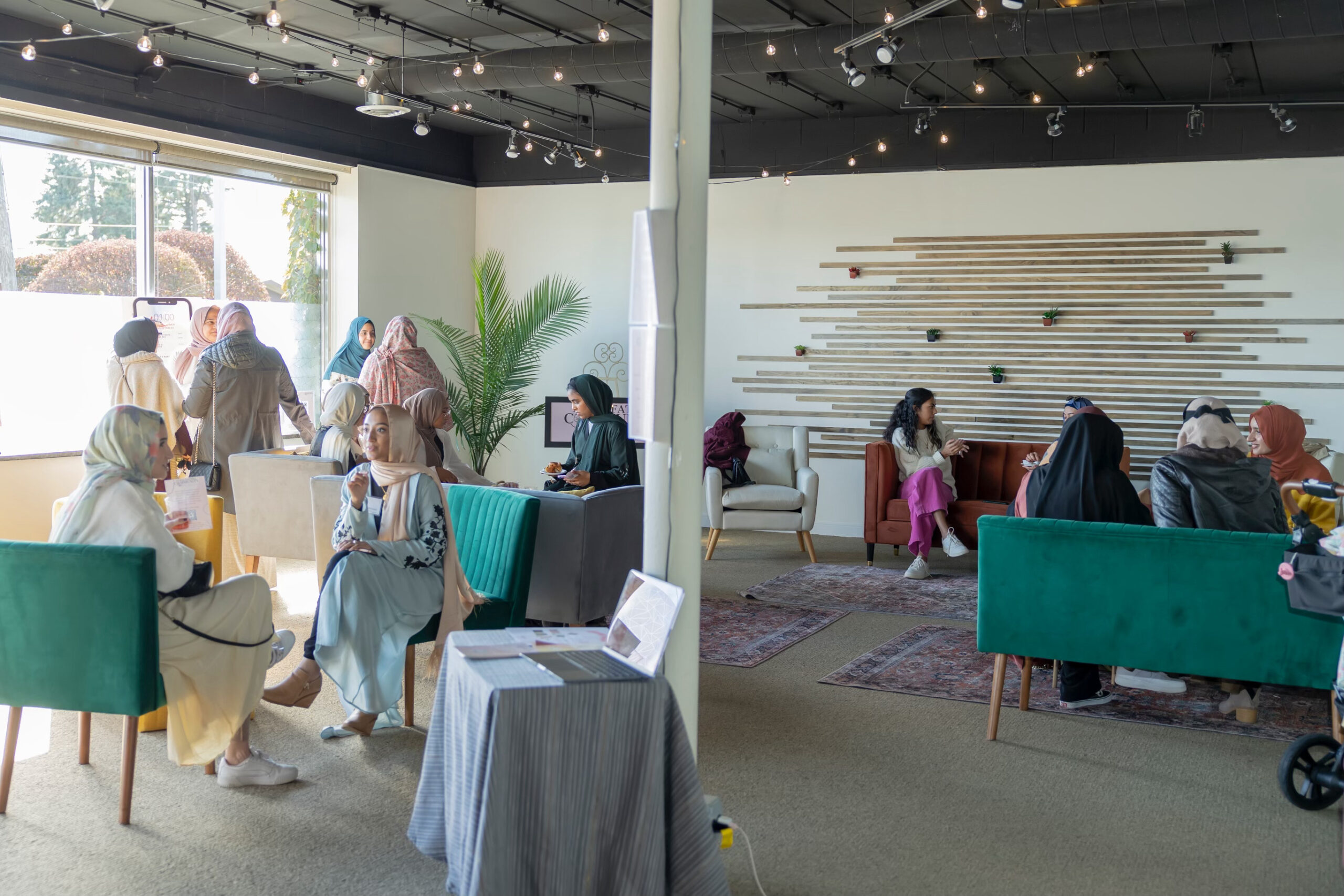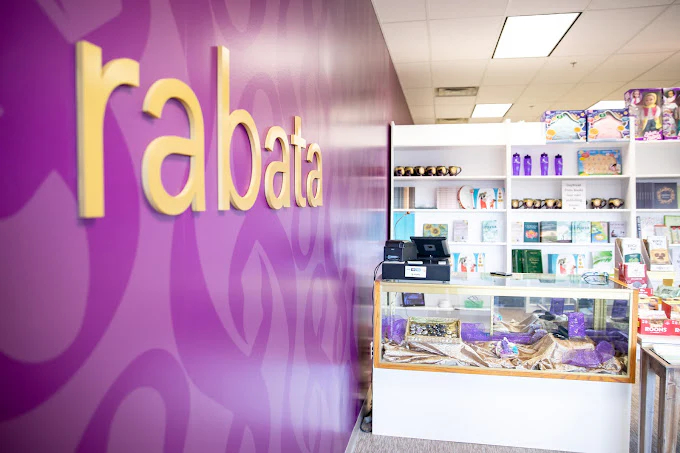Women-Focused Community Centers
By Sanaa Asif
Sep/Oct 2024

In this rat-race-like existence, Muslim women sometimes find it hard to balance work, family, and religion. More women are pursuing full-time careers after marriage and children. Yet the bulk of household duties still fall on them, a reality that leaves little time for uninterrupted worship. In addition, not all mosques have welcoming spaces for women and/or children.
Thus the emergence of women-led Muslim community centers has been a welcome development. Two prime examples are the Rabata Cultural Center (www.rabata.org), which has a heavy online presence and an in-person center in Arden Hills, Minn. — about eight miles from the downtowns of Minneapolis and Saint Paul — and the Aisha Fatima Community Center (AFC; aishafatimacommunity.org), which offers in-person classes and social gatherings in Chicago’s suburb of Lombard. Both organizations aim to build and reinforce spiritual knowledge and community through deen-centered, female-focused learning and activities.

“The inspiration for AFC basically came from the lack of Muslim women’s physical spaces, where we can interact and learn from female scholars, and also build community,” said co-founder Juwairiyah Kholwadia (founder, The Hijab Vault; https://thehijabvault.com/). Their main goal is to create a warm, welcoming and non-judgmental environment to integrate both the old and new communities of Chicago’s suburbs and provide a safe space for them to learn and grow together.
Rabata, from the Arabic words “to connect,” “form bonds of friendship,” and “composure”, had a similar starting point. Manager Michelle Sekusky describes how Anse Tamara Gray, EdD (founder, Rabata), an Islamic scholar, author, educator, and popular speaker, became inspired after noticing a void in women’s needs. “Education is really a key to positive cultural change, which is our vision and mission statement. It’s creating positive cultural change through creative educational experiences,” Sekusky said.
AFC started off with brainstorming sessions, involving input from women of various ages, backgrounds, and stages in life. They used the feedback to curate their programs. “We always knew that the core of AFC would focus on spirituality and religion, but we really wanted to incorporate and integrate discussions of taboo topics within the mental health field, the community health field, women’s wellness and health,” Kholwadia explains.
For instance, in June they convened a session about the Islamic views on cosmetic procedures. In addition to faith and learning, they also host social events such as watercolor night, geometric design workshops, and tatreez classes to give women a chance to connect.
Rabata had a similar journey, evolving from a simple bookstore to a center for in-person and hybrid programs. Their academic wing, Ribaat, has dozens of courses, classes, certifications, and ijazahs to choose from. “We went from just having random events to now having multiple regular monthly events. We also offer childcare for women taking classes,” Sekusky added. Rabata’s very ethnically diverse all-women board of directors feels more representative of our ummah’s diversity than many other centers — even mosques.
A Day Inside
Each day brings new experiences. “Truthfully, no day looks the same, even if it’s the same event,” Kholwadia states. However, some days need to be split between events and administrative work. Their planning days are more of a mental workout during which they focus on program ideation, creation, marketing, and registration. They reach out to their team to find the right instructor or connect with others to collaborate. They like to plan events ahead of time. For instance, Ramadan planning begins roughly six months in advance.
“We’re continuously looking for ways to improve and expand our offerings,” Kholwadia notes. “We welcome anyone who would like to join the AFC admin or volunteer team. We are actively looking for women with interest and knowledge of marketing, event planning, outreach, and fundraising.”
On the other hand, event days look very different. “On the day of an event, we’ll typically arrive 1 to 3 hours early. Volunteers help move tables, chairs, and even sofas to accommodate the crowds. AFC often provides refreshments and snacks during its events, which also need to be picked up. They also need to set up any technical equipment and other resources the presenter may need.
“Most importantly, we’ll have people ready to greet every attendee as they walk in, so they have someone to connect with even if they came alone,” Kholwadia remarks. Throughout the event, the team continuously makes sure attendees are comfortable and have everything they need.
Successes and Obstacles
As female-focused community centers develop a wider audience and attract larger crowds, they also experience both successes and obstacles. A major obstacle both centers faced was increasing their staff base. Sekusky started managing Rabata in 2021. At the height of the Covid-19 pandemic, much of its programs were online. But as the center continued to grow, many programs started becoming in-person. “In 2022 we grew so much at the Center that we were able to expand into the space next door. But as fast as we grew, we needed more people, right? Getting great staff always takes time,” Sekusky says. Rabata now also offers Rabateen classes for teenage girls and Dragonflies for 6–12-year-olds.
AFC has similar struggles. While they love their volunteers, they also know it’s hard to expect them to commit to something long term. Another issue was that people were asking for virtual programs, even though at its core AFC was all about their physical space. “We really wanted women to come out and get to know each other and learn in person,” Kholwadia explains. While they stayed true to their mission and continued encouraging in-person attendance for events, AFC also started hosting some virtual events to expand their presence nationwide.
As both community centers have continued to grow, they have learned to adapt to their audience’s preferences. Sekusky says that the online Rabata Academic Institute (www.facebook.com/rabataribaat/) attracts a wide variety of people. “It’s a serious program to dive into Islamic studies, and the reason I think it’s attractive for most of the students is that online classes are recorded,” she states. Having the flexibility to watch a lesson at a more convenient time can be attractive to busy parents, college students, or working individuals.
However, Sekusky also observes the appeal of in-person programs for others. “You find different crowds in different spaces — some people really need that social aspect; especially reverts need that family and bonding.” Overall, she sees value in both the online and in-person communities.
The AFC staff believes that the speaker plays a valuable role in attracting audiences. They have their regular speakers, to whom a lot of women have listened. Many attendees have a favorite speaker they connect with, and if they see her name they are quicker to register. “We really like to focus on the content of our events and want our attendees to feel a sense of personal development, but also [for them to] enjoy the space,” Kholwadia remarks. “Everybody loves food. Whenever we invite outside vendors with fancy bubble teas and coffee, it’s a hit. It’s great because we also get to support other small Muslim businesses within the community.”
Rabata and AFC strive to make women feel welcome and seen, whether through their programs or their environment. “Our teachers have dedicated their lives to being ‘forever students’ and knowledgeable teachers. They have studied traditionally and from so many paths that you’re learning from a well-rounded female scholar who is knowledgeable in whatever field of Islam she’s teaching,” Sekusy says. The wide variety of programs covered through Rabata and the welcoming, humble teachers play an important role in helping Muslim women located all around the nation gain knowledge and community.
Sanaa Asif, a senior at Hinsdale Central High School, is an avid reader and loves to learn and write about others and their experiences.
Tell us what you thought by joining our Facebook community. You can also send comments and story pitches to [email protected]. Islamic Horizons does not publish unsolicited material.
